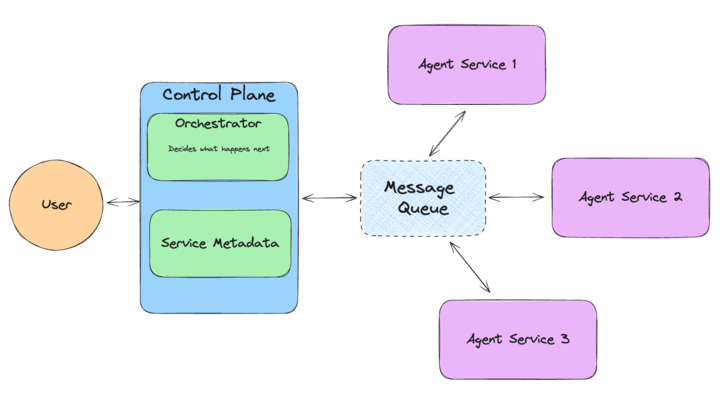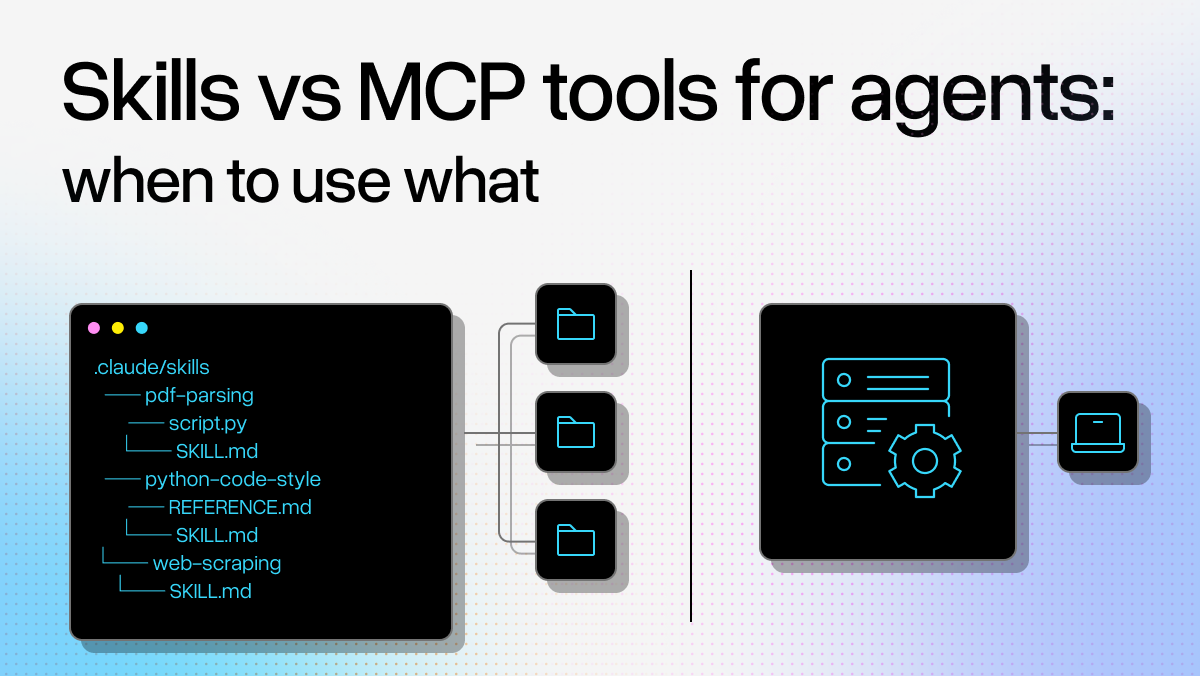We're excited to announce the alpha release of llama-agents , a new open-source framework designed to simplify the process of building, iterating, and deploying multi-agent AI systems and turn your agents into production microservices. Whether you're working on complex question-answering systems, collaborative AI assistants, or distributed AI workflows, llama-agents provides the tools and structure you need to bring your ideas to life.
Key Features of llama-agents
- Distributed Service Oriented Architecture: every agent in LlamaIndex can be its own independently running microservice, orchestrated by a fully customizable LLM-powered control plane that routes and distributes tasks.
- Communication via standardized API interfaces: interface between agents using a central control plane orchestrator. Pass messages between agents using a message queue.
- Define agentic and explicit orchestration flows: developers have the flexibility to directly define the sequence of interactions between agents, or leave it up to an “agentic orchestrator” that decides which agents are relevant to the task.
- Ease of deployment: launch, scale and monitor each agent and your control plane independently.
- Scalability and resource management: use our built-in observability tools to monitor the quality and performance of the system and each individual agent service
Let's dive into how you can start using llama-agents to build your own multi-agent systems.
Getting Started with llama-agents
First, install the framework using pip:
sh
pip install llama-agents llama-index-agent-openaiBasic System Setup
Here's a simple example of how to set up a basic multi-agent system using llama-agents. First we’ll bring in our dependencies and set up our control plane, which contains our LLM-powered orchestrator
python
import dotenv
dotenv.load_dotenv() # our .env file defines OPENAI_API_KEY
from llama_agents import (
AgentService,
ControlPlaneServer,
SimpleMessageQueue,
AgentOrchestrator,
)
from llama_index.core.agent import FunctionCallingAgentWorker
from llama_index.core.tools import FunctionTool
from llama_index.llms.openai import OpenAI
import logging
# turn on logging so we can see the system working
logging.getLogger("llama_agents").setLevel(logging.INFO)
# Set up the message queue and control plane
message_queue = SimpleMessageQueue()
control_plane = ControlPlaneServer(
message_queue=message_queue,
orchestrator=AgentOrchestrator(llm=OpenAI()),
)Next we create our tools using LlamaIndex’s existing abstractions, provide those tools to an agent, and turn that agent into an independent microservice:
python
# create a tool
def get_the_secret_fact() -> str:
"""Returns the secret fact."""
return "The secret fact is: A baby llama is called a 'Cria'."
tool = FunctionTool.from_defaults(fn=get_the_secret_fact)
# Define an agent
worker = FunctionCallingAgentWorker.from_tools([tool], llm=OpenAI())
agent = worker.as_agent()
# Create an agent service
agent_service = AgentService(
agent=agent,
message_queue=message_queue,
description="General purpose assistant",
service_name="assistant",
)Finally we launch the service and the control plane. Note that here we’re using a helper function to run a single query through the system and then exit; next we’ll show how to deploy this to production.
python
# Set up the launcher for local testing
from llama_agents import LocalLauncher
launcher = LocalLauncher(
[agent_service],
control_plane,
message_queue,
)
# Run a single query through the system
result = launcher.launch_single("What's the secret fact?")
print(result)Deploying Your Multi-Agent System
Once you've tested your system locally, you can deploy it as a set of services for real production use. Here's how you might set that up. This is similar to the previous example, but we’ve added a second agent service and we’re using a different launcher. Let’s bring in our dependencies and set up our control plane again:
python
import dotenv
dotenv.load_dotenv()
from llama_agents import (
AgentService,
AgentOrchestrator,
ControlPlaneServer,
SimpleMessageQueue,
)
from llama_index.core.agent import FunctionCallingAgentWorker
from llama_index.core.tools import FunctionTool
from llama_index.llms.openai import OpenAI
import logging
# change logging level to enable or disable more verbose logging
logging.getLogger("llama_agents").setLevel(logging.INFO)
# create our multi-agent framework components
message_queue = SimpleMessageQueue()
control_plane = ControlPlaneServer(
message_queue=message_queue,
orchestrator=AgentOrchestrator(llm=OpenAI()),
)Then as before we create a tool and an agent, though this time we’ll add a second agent:
python
# create a tool
def get_the_secret_fact() -> str:
"""Returns the secret fact."""
return "The secret fact is: A baby llama is called a 'Cria'."
tool = FunctionTool.from_defaults(fn=get_the_secret_fact)
# create our agents
worker1 = FunctionCallingAgentWorker.from_tools([tool], llm=OpenAI())
worker2 = FunctionCallingAgentWorker.from_tools([], llm=OpenAI())
agent1 = worker1.as_agent()
agent2 = worker2.as_agent()We turn those agents into services:
python
agent_server_1 = AgentService(
agent=agent1,
message_queue=message_queue,
description="Useful for getting the secret fact.",
service_name="secret_fact_agent",
host="localhost",
port=8003
)
agent_server_2 = AgentService(
agent=agent2,
message_queue=message_queue,
description="Useful for getting random dumb facts.",
service_name="dumb_fact_agent",
host="localhost",
port=8004
)And finally we launch each service as an independent agent. Here we’re doing them all from a single script, but each of these could be a totally separate service, launched and scaled independently:
python
from llama_agents import ServerLauncher, CallableMessageConsumer
# Additional human consumer
def handle_result(message) -> None:
print(f"Got result:", message.data)
# the final result is published to a "human" consumer
# so we define one to handle it!
human_consumer = CallableMessageConsumer(
handler=handle_result, message_type="human"
)
# Define Launcher
launcher = ServerLauncher(
[agent_server_1, agent_server_2],
control_plane,
message_queue,
additional_consumers=[human_consumer]
)
launcher.launch_servers()Real-time monitoring
One of the coolest debugging features of our multi-agent system is our agent monitor, which is built right in. You launch it like this:
sh
llama-agents monitor --control-plane-url http://127.0.0.1:8000Once launched, you get an intuitive, point-and-click terminal application. You can see both of the agents running, and at the bottom you can inject a task like the query “What is the secret fact?” You’ll get a job ID which you can then click on to see your results:

Building a Query Rewriting RAG System
Let's look at a more complex example: a Query Rewriting RAG system. This system will rewrite user queries to improve retrieval, then use the rewritten query to perform RAG over a document.
This example demonstrates how to create a more sophisticated system that combines query rewriting with RAG to improve question-answering capabilities. See this notebook for a fuller explanation of what’s going on.
python
import dotenv
dotenv.load_dotenv() # our .env defines OPENAI_API_KEY
from llama_index.core import VectorStoreIndex, Document
from llama_index.core.agent import FnAgentWorker
from llama_index.core import PromptTemplate
from llama_index.core.query_pipeline import QueryPipeline
from llama_index.core.query_engine import RetrieverQueryEngine
from llama_agents import (
AgentService,
ControlPlaneServer,
SimpleMessageQueue,
PipelineOrchestrator,
ServiceComponent,
)
from llama_agents.launchers import LocalLauncher
from llama_index.llms.openai import OpenAI
import logging
# change logging level to enable or disable more verbose logging
logging.getLogger("llama_agents").setLevel(logging.INFO)
# Load and index your document
docs = [Document(text="The rabbit is a small mammal with long ears and a fluffy tail. His name is Peter.")]
index = VectorStoreIndex.from_documents(docs)
# Define a query rewrite agent
HYDE_PROMPT_STR = (
"Please rewrite the following query to include more detail:\n{query_str}\n"
)
HYDE_PROMPT_TMPL = PromptTemplate(HYDE_PROMPT_STR)
def run_hyde_fn(state):
prompt_tmpl, llm, input_str = (
state["prompt_tmpl"],
state["llm"],
state["__task__"].input,
)
qp = QueryPipeline(chain=[prompt_tmpl, llm])
output = qp.run(query_str=input_str)
state["__output__"] = str(output)
return state, True
hyde_agent = FnAgentWorker(
fn=run_hyde_fn,
initial_state={"prompt_tmpl": HYDE_PROMPT_TMPL, "llm": OpenAI()}
).as_agent()
# Define a RAG agent
def run_rag_fn(state):
retriever, llm, input_str = (
state["retriever"],
state["llm"],
state["__task__"].input,
)
query_engine = RetrieverQueryEngine.from_args(retriever, llm=llm)
response = query_engine.query(input_str)
state["__output__"] = str(response)
return state, True
rag_agent = FnAgentWorker(
fn=run_rag_fn,
initial_state={"retriever": index.as_retriever(), "llm": OpenAI()}
).as_agent()
# Set up the multi-agent system
message_queue = SimpleMessageQueue()
query_rewrite_service = AgentService(
agent=hyde_agent,
message_queue=message_queue,
description="Query rewriting service",
service_name="query_rewrite",
)
rag_service = AgentService(
agent=rag_agent,
message_queue=message_queue,
description="RAG service",
service_name="rag",
)
# Create the pipeline
pipeline = QueryPipeline(chain=[
ServiceComponent.from_service_definition(query_rewrite_service),
ServiceComponent.from_service_definition(rag_service),
])
orchestrator = PipelineOrchestrator(pipeline)
control_plane = ControlPlaneServer(
message_queue=message_queue,
orchestrator=orchestrator,
)
# Set up the launcher
launcher = LocalLauncher(
[query_rewrite_service, rag_service],
control_plane,
message_queue,
)
# Run a query
result = launcher.launch_single("Tell me about rabbits")
print(result)Public roadmap
This is an alpha release, meaning that we’d love your feedback on features to better help you build multi-agent systems in production! We’ve created a public roadmap showing where we plan to go from here. We’re actively seeking public feedback on what works for you and what doesn’t.
Dive in!
llama-agents provides a powerful, flexible framework for building complex multi-agent AI systems. Whether you're prototyping a new idea or scaling to production, llama-agents offers the tools you need to bring your AI vision to life. Check out the repo to learn more, especially our library of examples.
We're excited to see what the community builds with llama-agents . Happy coding!





